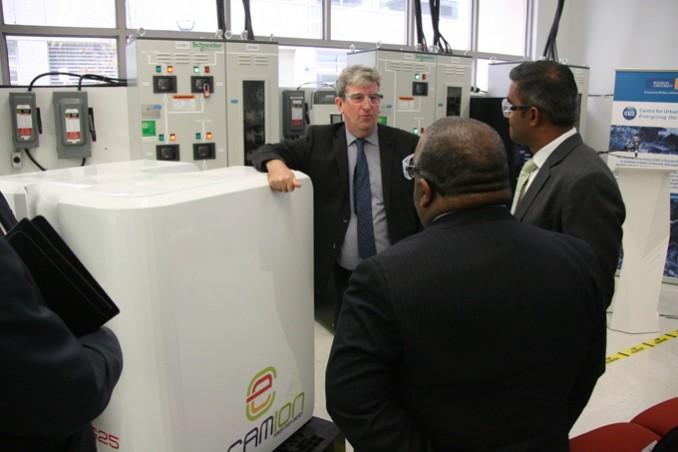By Justin Chandler
Researchers at Ryerson’s Centre for Urban Energy (CUE) have developed an electricity storage unit that could make cities’ power grids more efficient.
Consisting of lithium-ion batteries that connect to the Smart-Meters on transformers, the unit is designed to be encased in a white, 1.5-metre-tall cube and mounted atop a hydro pole. The unit stores power during off-peak hydro hours when electricity use is low. When electricity is more costly and difficult to produce during peak times, the unit releases its stored energy into whatever the transformer is powering, thereby reducing the amount of electricity drawn from the power grid.
“Sometimes thinking inside the box is a good thing,” Ontario’s minister of the environment and climate change Glen Murray said, referring to the storage unit’s cubed shell.
He said one way Ontario could help other cities, states and countries become more energy efficient would be to install versions of CUE’s storage unit in developing parts of the world.
Bala Venkatesh, academic director for the CUE, said the storage unit will make electrical infrastructure cheaper, greener and more adaptable.
On Wednesday morning, the CUE held a press conference at their headquarters on Dalhousie Street to unveil the prototype of their new energy storage unit. About 20 people from the CUE, Toronto Hydro, Scarborough energy-storage company eCamion and the Ontario Government attended.
The storage unit was designed and created over a three-year period as part of a collaboration between Ryerson, Toronto Hydro and eCamion. Of the roughly $1.2-million-project, about $600,000 was funded by the Ontario government’s Smart Grid Fund. Supported by Ontario’s Ministry of Energy, the Smart Grid Fund invests in technologies designed to improve Ontario’s electricity grid.
Gary Thompson, head of generation and capacity planning at Toronto Hydro, said Toronto’s hydro system is old and unreliable. He said it needs to be replaced “smartly.”
The project’s lead researcher Mohamed Awadallah said local power-distribution companies such as Toronto Hydro often have a hard time managing load values. He said CUE’s storage unit can help solve that problem.
The prototype storage unit can store up to 15.9 kilowatt-hours of electricity, enough to work for six to nine houses, but it could be scaled up to work on more, Awadallah said. Currently the unit costs too much to make, but as cheaper parts are developed for it, the price will become marketable. Then the unit could be used by the city, factories and private facilities.













Leave a Reply